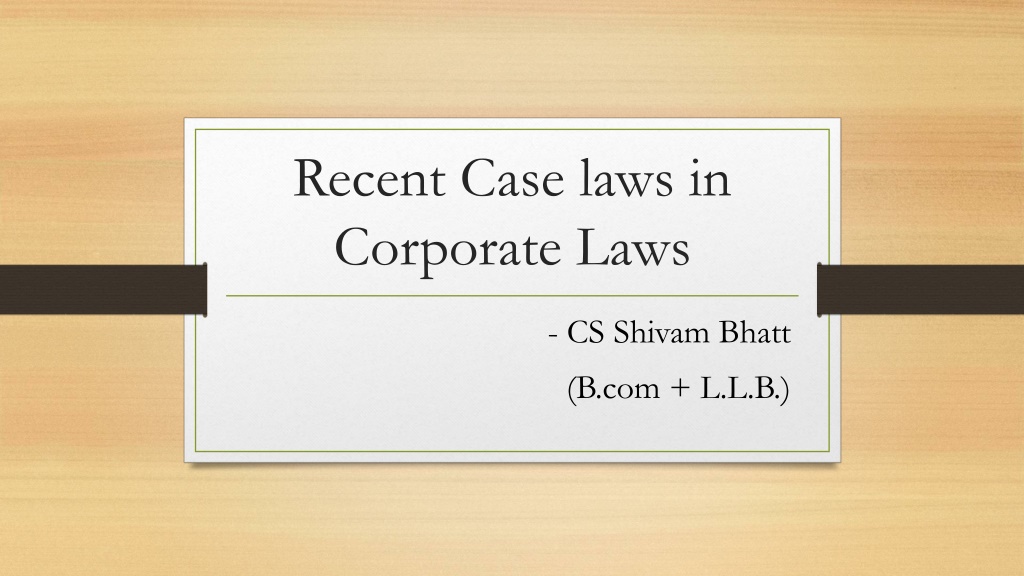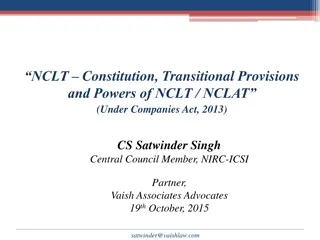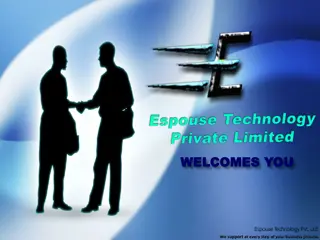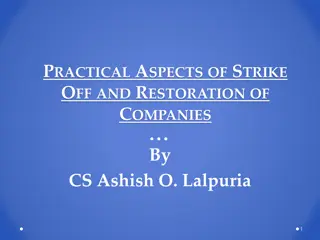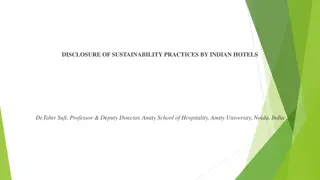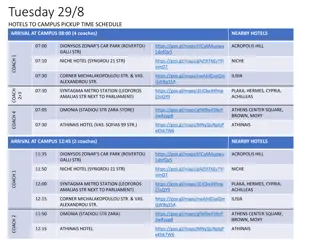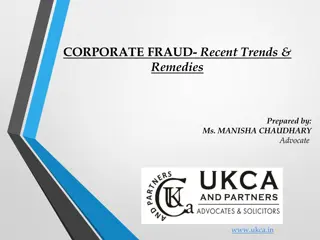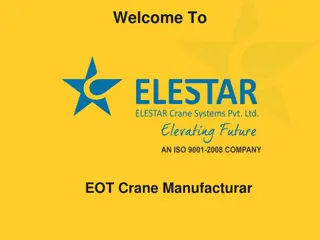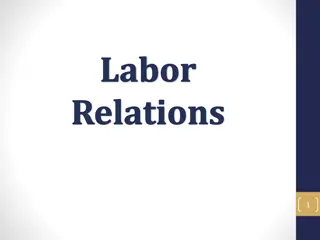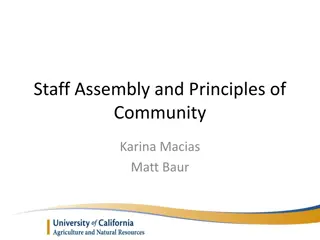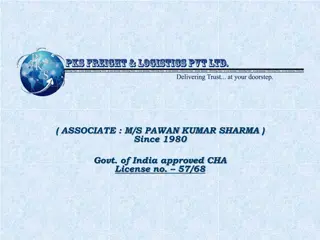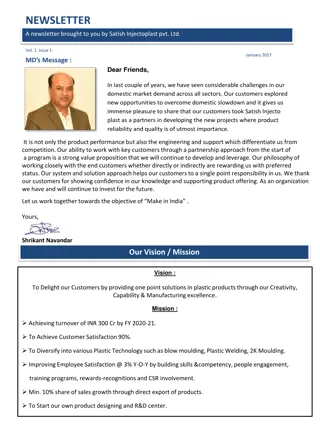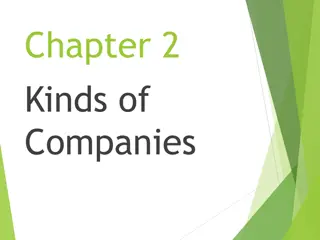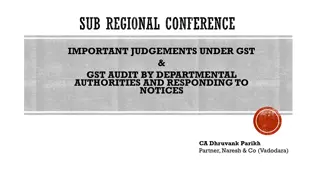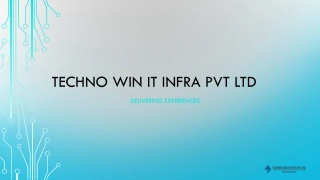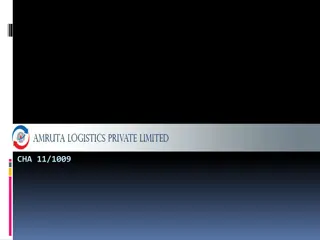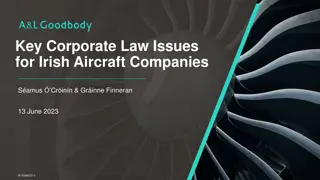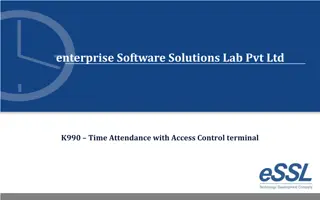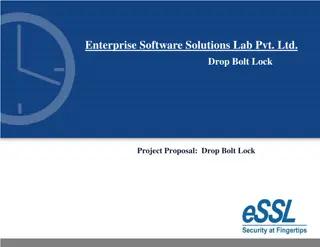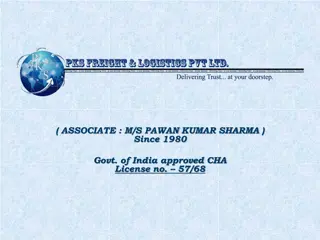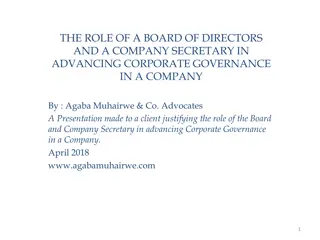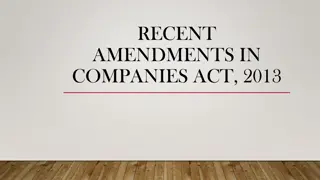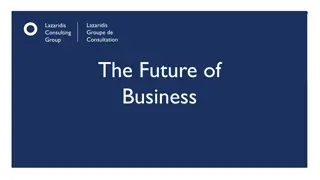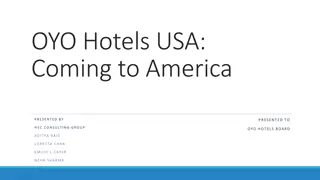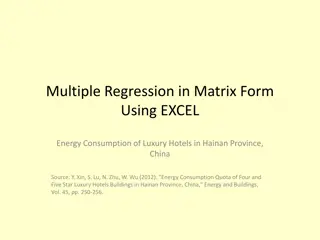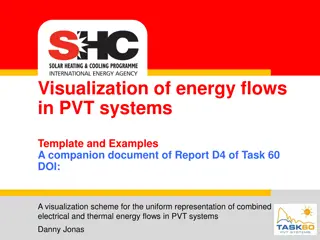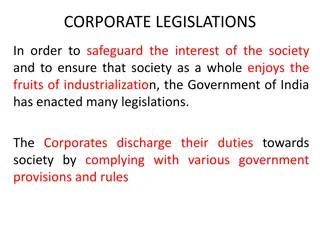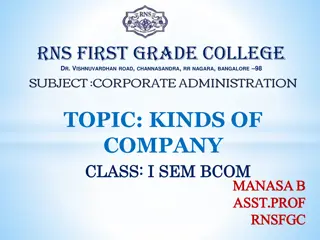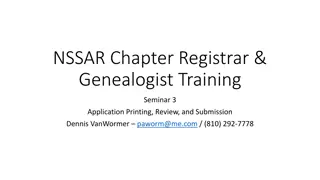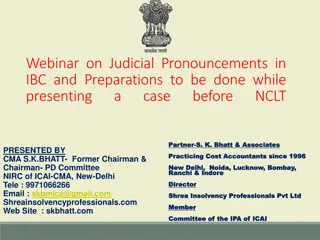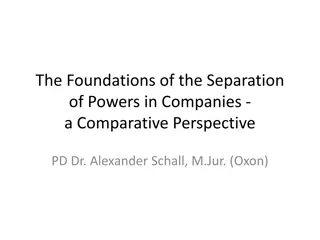Recent Case Laws in Corporate Laws - Economy Hotels India Services Pvt. Ltd. v. Registrar of Companies & ANR. (NCLAT)
In this case, Economy Hotels India Services Pvt. Ltd. filed a petition under Section 66 of the Companies Act for confirming the reduction of share capital. The National Company Law Tribunal (NCLT) rejected the application, but the National Company Law Appellate Tribunal (NCLAT) allowed the reduction, emphasizing that a typographical error in the minutes did not invalidate the special resolution. The key provisions under Section 66 of the Companies Act, 2013 were involved, giving the Tribunal power to confirm or reject such reductions.
Download Presentation

Please find below an Image/Link to download the presentation.
The content on the website is provided AS IS for your information and personal use only. It may not be sold, licensed, or shared on other websites without obtaining consent from the author. Download presentation by click this link. If you encounter any issues during the download, it is possible that the publisher has removed the file from their server.
E N D
Presentation Transcript
Recent Case laws in Corporate Laws - CS Shivam Bhatt (B.com + L.L.B.)
Disclaimer The views and opinions expressed in this presentation are my own views and are subject to my understanding of the subject and do not necessarily represent views of the any organization(s). Content Courtesy: Many sources have been considered including website www.legalmantra.net
Abbreviations Used: NCLT National Company Law Tribunal NCLAT National Company Law Appellate Tribunal ROC Registrar of Companies
Index 1. Discussion on Case laws 2. Q & A Session 3. Closing Remarks
1. ECONOMY HOTELS INDIA SERVICES PRIVATE LIMITED V. REGISTRAR OF COMPANIES & ANR. (NCLAT) Brief Facts: The Company had filed a petition under Section 66 of the Companies Act praying for confirming the reduction of share capital. In the extract of the minutes submitted to NCLT, it was written that the unanimous ordinary resolution required for reduction has been obtained. The NCLT rejected the application for reduction. Hence the company has filed appeal with NCLAT pleading that it was a mere typographical error in the minutes characterising the special resolution as unanimous ordinary resolution and the Appellant had filed the special resolution with ROC and fulfilled all the statutory requirements prescribed in the Companies Act, 2013, hence, the order of the Tribunal is liable to set aside.
1. ECONOMY HOTELS INDIA SERVICES PRIVATE LIMITED V. REGISTRAR OF COMPANIES & ANR. (NCLAT) Decision: Merely characterizing the special resolution as unanimous ordinary resolution will not render a special resolution as invalid. The special resolution passed is very well valid. NCLAT has allowed the reduction. a in the extract of typographical error Minutes ,
1. ECONOMY HOTELS INDIA SERVICES PRIVATE LIMITED V. REGISTRAR OF COMPANIES & ANR. (NCLAT) Provisions Involved: Section 66 of Companies Act, 2013 states that a Company limited by shares or limited by guarantee and having a share capital may, reduce the share capital by passing a special resolution, subject to the confirmation by the Tribunal (NCLT) and alter its memorandum by reducing the amount of its share capital and of its shares accordingly. The Tribunal has the absolute power to confirm or reject the scheme of reduction
2. BANK OF BARODA V. ABAN OFFSHORE LIMITED (NCLAT) Brief Facts: The appellants being preference shareholders have filed an application to NCLT for redemption of preference shares under section 55(3) or section 245 of the Act. NCLT, Chennai Bench (Tribunal) has dismissed the application of Appellant solely on the ground that the Appellant being preferential shareholders has no locus standi (the right or capacity to bring an action or to appear in a court) to file application for redemption of shares under Section 55(3) of the Companies Act, 2013 or even under Section 245 of the Companies Act, 2013. Aggrieved by the order of NCLT, The appellants have filed an appeal to NCLAT. The legal question involved is, whether there is any remedy under law available to preference shareholders for filing application for redemption of preference shares?
2. BANK OF BARODA V. ABAN OFFSHORE LIMITED (NCLAT) Decision: NCLAT held that Preference shareholders are not remediless for redemption of preference shares, they can file an application under Section 55(3) of the Companies Act, 2013 or alternatively they may also file application under Section 245 of the Companies Act, 2013 as a Class Action Suit.
2. BANK OF BARODA V. ABAN OFFSHORE LIMITED (NCLAT) Provisions Involved: Section 55 of the Companies Act, 2013 was to compulsorily provide for redemption of preference shares by doing away with the issue of irredeemable preference shares.
3. THE REGISTRAR OF COMPANIES, WEST BENGAL V. KARAN KISHORE SAMTANI (NCLAT) Brief Facts: The Respondent was the Director, for more than 20 Companies till 31.03.2015. On 27.01.2016 the Registrar of Companies, West Bengal sent show cause notice on the ground that he was the Director of more than 20 Companies at once. The Respondent admitted the guilty and sent representation to the Registrar with a request to compound the offence under Section 441(1) of the Companies Act, 2013. ROC forwarded the representation along with his report to the Tribunal.
3. THE REGISTRAR OF COMPANIES, WEST BENGAL V. KARAN KISHORE SAMTANI (NCLAT) After hearing the parties the NCLT Kolkata Bench (Tribunal) allowed the compounding application subject to payment of compounding fees of Rs. 50,000/-. Being aggrieved with this order, ROC has filed this Appeal saying that the minimum fine prescribed for the offence is more than 50,000, Hence the compounding fees of 50,000 is not appropriate. The issue for consideration is, whether Tribunal can impose the compounding fees, less than minimum fine prescribed for the offence under the Act.
3. THE REGISTRAR OF COMPANIES, WEST BENGAL V. KARAN KISHORE SAMTANI (NCLAT) Decision: The compounding fees has to be more than or equal to the minimum fine prescribed under the Act. Provisions Involved: Section 165(6) of Companies act, 2013 states (before the amendment) If a person accepts an appointment as a director in contravention of sub- section (1), he shall be punishable with fine which shall not be less than five thousand rupees but which may extend to twenty-five thousand rupees for every day after the first during which the contravention continues.
4. LATE MONA AGGARWAL THROUGH HER LEGAL HEIR MR. VIJAY KUMAR AGGARWAL & ANR. V. GHAZIABAD ENGG. COMPANY LTD. & ORS. (NCLAT) Brief Facts: The question for consideration is that during the pendency of winding up petition the name of the company has been struck off under Section 248 of the Companies Act 2013. In such circumstances whether the NCLT can proceed with winding up petition or not? NCLT rejected the petition for winding up with liberty to the petitioner to file a fresh petition for winding up as and when the Respondent company is revived. Being aggrieved with this order the Appellants have filed this appeal.
4. LATE MONA AGGARWAL THROUGH HER LEGAL HEIR MR. VIJAY KUMAR AGGARWAL & ANR. V. GHAZIABAD ENGG. COMPANY LTD. & ORS. (NCLAT) Decision: NCLAT held that even after removal of the name of the company from the register of companies the NCLT can proceed with the petition for winding up under Companies Act, 2013. Provisions Involved: While interpreting sub-section (8) of Section 248, it is clear that Section 248 in no manner will affect the powers of the Tribunal to wind up the Company, the name of which has been struck off from the ROC.
5. SHIKHA SHARMA BAGGA V. UNION OF INDIA (DELHI HC) Brief Facts: A petition was filed before the Delhi High Court challenging the non-providing of a field for Advocates to register companies and LLPs on the current Ministry of Corporate Affairs ( MCA ) portal. The petitioner case was that the MCA portal permitted Chartered Accountants, Company Secretaries and Cost & Work Accountants to register as practising professionals and undertake incorporation of companies and LLPs for their clients.
5. SHIKHA SHARMA BAGGA V. UNION OF INDIA (DELHI HC) An amendment took place in the Companies Act, 2013 in 2014 by which even Advocates were permitted to file documents for incorporation of companies. For the said purpose, an Advocate would have to first register himself/herself as a practicing professional. However, the said amendment was not implemented in the tool Kit used by MCA. As a result, Advocates could not register companies/LLPs on behalf of their clients. Hence, the Petitioner prays that consequential amendment be carried out in the MCA tool kit permitting Advocates who are enrolled with the Bar Council to register as professionals in the MCA portal.
5. SHIKHA SHARMA BAGGA V. UNION OF INDIA (DELHI HC) Decision: Delhi High Court held that advocates can file documents for incorporation of a company/ LLPs and ordered MCA tool kit had to be amended, which are enrolled with advocates. The Bar Council will register as professionals in the MCA portal.
5. SHIKHA SHARMA BAGGA V. UNION OF INDIA (DELHI HC) Provisions Involved: Section 7(1)(b) of Companies Act, 2013 read with rule 14 of the Companies (Incorporation) Rules, 2014 state that a declaration in the Form No. INC-8 by an advocate, a chartered accountant, cost accountant or company secretary in practice, who is engaged in the formation of the company, and by a person named in the articles as a director, manager or secretary of the company, that all the requirements of this Act and the rules made thereunder in respect of registration and matters precedent or incidental thereto have been complied with.
Thank you ICAI Rajkot Chapter! Thank you, Members for active participation! CS SHIVAM BHATT bhattshivam2011@gmail.com | www.proshivambhatt2023.blogspot.com | Hand: +91 89054 25230
